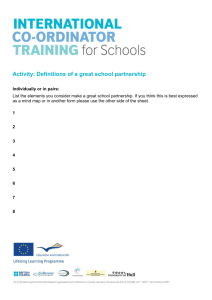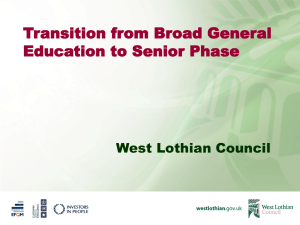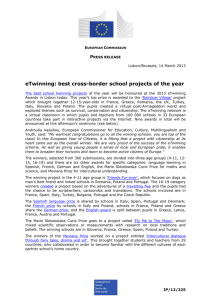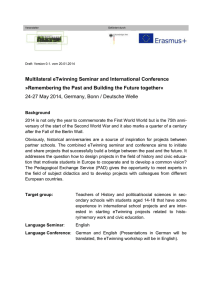Education Scotland Transformative Change (TC): Impact review –
advertisement
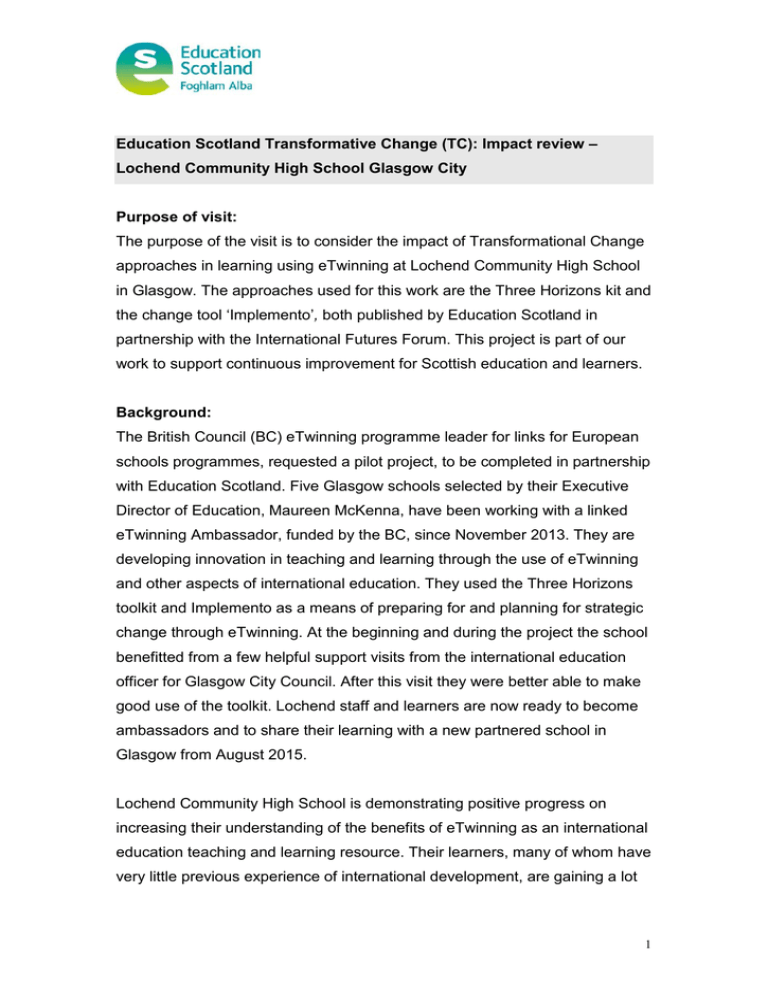
Education Scotland Transformative Change (TC): Impact review – Lochend Community High School Glasgow City Purpose of visit: The purpose of the visit is to consider the impact of Transformational Change approaches in learning using eTwinning at Lochend Community High School in Glasgow. The approaches used for this work are the Three Horizons kit and the change tool ‘Implemento’, both published by Education Scotland in partnership with the International Futures Forum. This project is part of our work to support continuous improvement for Scottish education and learners. Background: The British Council (BC) eTwinning programme leader for links for European schools programmes, requested a pilot project, to be completed in partnership with Education Scotland. Five Glasgow schools selected by their Executive Director of Education, Maureen McKenna, have been working with a linked eTwinning Ambassador, funded by the BC, since November 2013. They are developing innovation in teaching and learning through the use of eTwinning and other aspects of international education. They used the Three Horizons toolkit and Implemento as a means of preparing for and planning for strategic change through eTwinning. At the beginning and during the project the school benefitted from a few helpful support visits from the international education officer for Glasgow City Council. After this visit they were better able to make good use of the toolkit. Lochend staff and learners are now ready to become ambassadors and to share their learning with a new partnered school in Glasgow from August 2015. Lochend Community High School is demonstrating positive progress on increasing their understanding of the benefits of eTwinning as an international education teaching and learning resource. Their learners, many of whom have very little previous experience of international development, are gaining a lot 1 from working on this project. Indeed since the commencement of the eTwinning work the school has gone on to complete other very successful international work which is still ongoing. From the beginning of the task work, learners have been involved in the decisions on what information would be shared and which skills they wished to develop and then share with their partner school. This included expanding the use of research information, working as a team, enhancing their digital technology skills and delivering presentations. These are all skills for life and work that the learners will be able to use in other areas of their learning. Review process: The eTwinning activities and the subsequent other international work completed have enhanced young people’s knowledge and skills in developing the capabilities and attributes of the four capacities of Curriculum for Excellence. Two members of staff from the school attended the initial training session in September 2013 with Glasgow City Council, British Council and other partners. Thereafter, a working group was set up in the school which comprised of four staff who participated in the same training. This training supported the staff to plan the implementation of eTwinning to support learning and teaching of pupils in the Social Subjects department. Staff also participated in further training with their ambassador which improved their understanding and improved confidence in the use of eTwinning and setting up a twin space. The review process was designed to ensure an independent review of impact based on affirmation of the school’s self-evaluation. Independence was assured through the composition of the review team. This comprised of the HMI on the project team and an Education Scotland Associate Assessor inspector with great experience of developing and leading work in the 2 secondary sector of another local authority. The success of the project was achieved through a range of activities, including producing a video and writing diary entries and newspaper articles. It also included young people offering very confident explanations on all their learning to the two visiting school inspectors. The HMI team confirmed the quality of the work through a morning visit that included meetings with senior managers, staff and learners. The young people demonstrated great confidence and enjoyed sharing their knowledge and work from completing the project. 1. Findings of the review The review team found strong evidence which supports the school’s self-evaluation account. As a result, we are confident in affirming their content as accurate. Evaluation findings: The senior management of Lochend Community High School submitted a detailed self-evaluation account which describes the learning and developments put in place as intended outcomes and objectives of their work. During the evaluation morning the headteacher, depute headteacher and other participating staff gave a detailed report of their progress using the approaches, as well as describing how they are continuing to take forward eTwinning and their subsequent international work this session. These priorities were analysed and confirmed during the visit. We found that good progress has been made in eTwinning. The school had initially had a few issues to resolve before the evaluation took place and as a result the evaluation was slightly delayed from its original date. This has proved to be a very positive decision taken by the school as it has enabled 3 them to complete better outcomes to be evaluated. The school has a clear plan for developing the work they have begun and they aim to make a greater impact over the future. Staff on the project have led the learners well and have benefitted greatly from the leadership opportunities offered to them through participation in this work. The senior management has encouraged and supported their staff to take full ownership of the project and the successes achieved with the learners. Staff have shown increased enjoyment in their work and were proud to share their successes along with the learners. The Three Horizons approach was used at the beginning of the project. This was led by Lesley Atkins the International development officer for Glasgow with assistance during the project from the British Council ambassador. Using Transformational Change (TC) approaches is helping staff to develop and broaden their thinking and change present mind-sets. The TC approach was considered a little non-user friendly at first but after advice from the school ambassador, staff felt the tool was better understood. Lochend learners worked well and enjoyed engaging with the eTwinning tool when it was available and running properly. The work completed has increased pupil ambition in a school with one of the highest levels of deprivation in Scotland. It has to be noted that in September 2014 the school had 71.9 per cent of their pupils in SIMD 1, the fifth highest proportion of any secondary in Scotland. This work has helped to broaden the horizons of the group of S1 (now S2 pupils) participating in the project. The work has also contributed to increased pupil motivation. Pupils’ awareness of different countries and cultures has been enhanced through the participation in the ongoing international links and projects. The school has become more focussed on the development of international education in general as a result of their initial involvement in the pilot. As part of their improvement planning for 2014-15 the school also strengthened their links with German partners through an Erasmus+ project. This project in 4 Nuremberg enabled pupils to gain a new eTwinning partner school. This has further enhanced their international links. As a result of a visit to Nuremberg, where they shared good practice with other countries, the school has now placed greater emphasis on School-Business Partnerships. Staff in the school are demonstrating a greater understanding of educational systems beyond Scotland. This is in turn helping them to self-evaluate better and recognise the strengths and areas for development within their own school. Through involvement in the eTwinning pilot the school is now a core partner with Glasgow City Council’s Erasmus Plus project on developing young people’s employability skills with Nuremberg and Maastricht. S2 pupils have uploaded samples of pupil work on World War 1 to their Erasmus eTwinning partner school, which was part of an agreed project, following a visit from staff from their partner school in March 2015. Pupils have been highly engaged in the learning opportunities from this work and as a result their motivation is improved. This was demonstrated well by the young people themselves during the HMI visit. The outcomes to be overtaken during the work from the work have been written up in the school’s ‘Implemento’ which was written during the planning phase of the work. The school have also engaged fully in a project in another international partnership with Strathclyde University where some S2 pupils will undertake the study of Chinese language and culture. They have been able to involve and share work with a Chinese partner through the twin space. This allows global school partners to join up, once a firm European partnership has been established. The school also aims to develop and utilise the eTwinning tool to share work and ideas with the established Chinese partner school. Staff have planned a school trip to China for a group of S2 pupils in April 2016. Pupils participating in this work shared their early learning in Mandarin enthusiastically with the visiting team. The medium term goal for pupils is to strengthen the partnership with the Chinese school via etwinning. Through the pupils’ experiences and learning in the project the pupils will be given the 5 opportunity to achieve a qualification related to Chinese language, culture, literature and heritage either within SQA qualifications or the Hanban system. The long term goal is for the pupils from the secondary school to spend a gap year working/studying in China on exit here. During the visit young people demonstrated well the skills they are developing as a result of participation in this work. They explained how they are choosing to attend evening classes where they experience a variety of learning linked to Chinese culture. Their enjoyment and commitment is so strong they would like to carry on their work during their school breaks. Young people demonstrated to our team that sharing ideas and their thinking with young people from other countries is extremely motivating and links in well to the tenets of Curriculum for Excellence. These ongoing international projects also demonstrate well the school’s distributed leadership model, with the pupils and their teachers taking a key role in how the project continues to develop. Staff and learners benefited a lot from using the ‘Implemento’ tool to consider the best and worst case scenarios before commencing with the work. Areas for development: During the pilot a number of technical issues surfaced around the use of digital technology to support the eTwinning portal. Lesley Atkins, the international development officer, has prepared a paper which has been submitted to the British Council for action. To date there are still outstanding issues to be overtaken to enable learners in Glasgow to use the tool easily and these need to be addressed for any further work on eTwinning to be successful next session. The linked ambassador to the school was very supportive, and assisted well to resolve a few of the initial technical challenges. At present the school is still unable to use the eTwinning portal in the school as it is only available through the use of Google Chrome which Glasgow is not yet using. This means all uploaded work needs to be 6 completed by one of the participating members of staff which is not best learning practice for the young people. The school has also recognised the following areas for further development: • They will begin to expand the use of eTwinning to more pupils via a dedicated staff working group next session. This etwinning working group will be led by a principal teacher with good experience in international education to expand the use of the tool and international education across the school. • Staff will register all S1 pupils with an eTwinning account and continue to roll out the learning approach to younger pupils as they arrive at Lochend. • Learners will work with new partners from different backgrounds and cultures on more projects and shared work further. • Staff will include the development of eTwinning across the school in next year’s school improvement plan. • In the medium term the China project will move to encourage pupils to strengthen their partnership with their partner Chinese school via eTwinning 2. Impact on all stakeholders: raising ambition and expectations for change. We found that staff and young people are enjoying leading this project work. Young people are able to take video and write newsletters to demonstrate effectively the knowledge they have gained. The international partnership work begun and completed this session using eTwinning, enables an increased confidence in the staff and learners and has increased greatly the understanding of international education within the curriculum. The ethos and morale of the learners and staff in the school are enhanced well by this new 7 international dimension to young people’s learning. Staff and learners are keen to see the technical issues resolved and then continue to use eTwinning further next session to support teaching and learning further across the curriculum. 3. Impact on learners: improving skills for learning, life and work Young people demonstrated through their conversations with us that they are benefitting from studying and then teaching other learners about their own city and sharing aspects of history. They were proud to demonstrate the words they had learned in Mandarin and confident enough to use them in public. They completed relevant pieces of written work to support the project on the theme of ‘Scotland’. They learned to work as part of a team and sometimes by working in pairs. Through their work, learners enhanced their knowledge of media studies skills and built up their confidence in public speaking. Through this project young people have shown a pride in their own country, its history and its people. Staff and children’s knowledge of the use of digital technology has increased. As a result of their work in eTwinning young people have an awareness now of how information can be shared through the twin space. They are developing digital technology skills and how to perform well presenting new information to other learners. The knowledge, skills and experiences gained were exemplified well through the research materials exemplified by the learners to the HMI team during the visit. 4. Impact on leaders: empowering, facilitating and equipping leaders at all levels. 8 We are confident that the distributive leadership of the headteacher and DHT and the teamwork of the principal teacher and other staff members, enables all the learners to have freedom within a framework to lead an entire project to completion. Being part of the project has helped young people at Lochend Community High School develop a better awareness of their wider world. These learners will continue to benefit from these international projects next session as eTwinning continues to evolve at the school. 5. Conclusion At the beginning of this partnership between the British Council and Education Scotland, staff at Lochend Community High School used the Transformational Change approaches to open their ideas to new ways of learning that are fit for the 21st century. They developed an action point of developing an eTwinning project, for a group of learners in S2, choosing this activity as part of a free choice across learning. This work widened the children’s knowledge and understanding of their world and in particular the world as seen in Glasgow and in their partner school in Nuremberg. Further international work completed demonstrates an enhanced understanding of learning with their new partner and ongoing partner school in China. The two approaches (Three Horizons and Implemento) are being used well by staff and they are now rightly very proud of the early outcomes that have led to exciting, creative and deep learning for the group of learners participating in the project. These outcomes include enhanced skills in digital technology, the development of e-Twinning to effect positive curriculum developments and a better understanding of the history and geography of their own local area and that of their partner schools in Nuremberg and now also in China. 9 The next steps are to continue linking with the Nuremberg school when the digital issues are resolved and to continue building on the other successful international partnerships being built this session. Staff demonstrate an increasing confidence and a desire to take forward leadership through the use of eTwinning. They confirm they are now able to demonstrate the use of Transformational Change approaches and how to take forward eTwinning for new staff and for other interested staff within their education authority and in other local authorities. We look forward to hearing about their continuing developments next session. Aileen Monaghan HMI Audrey May AA 10

